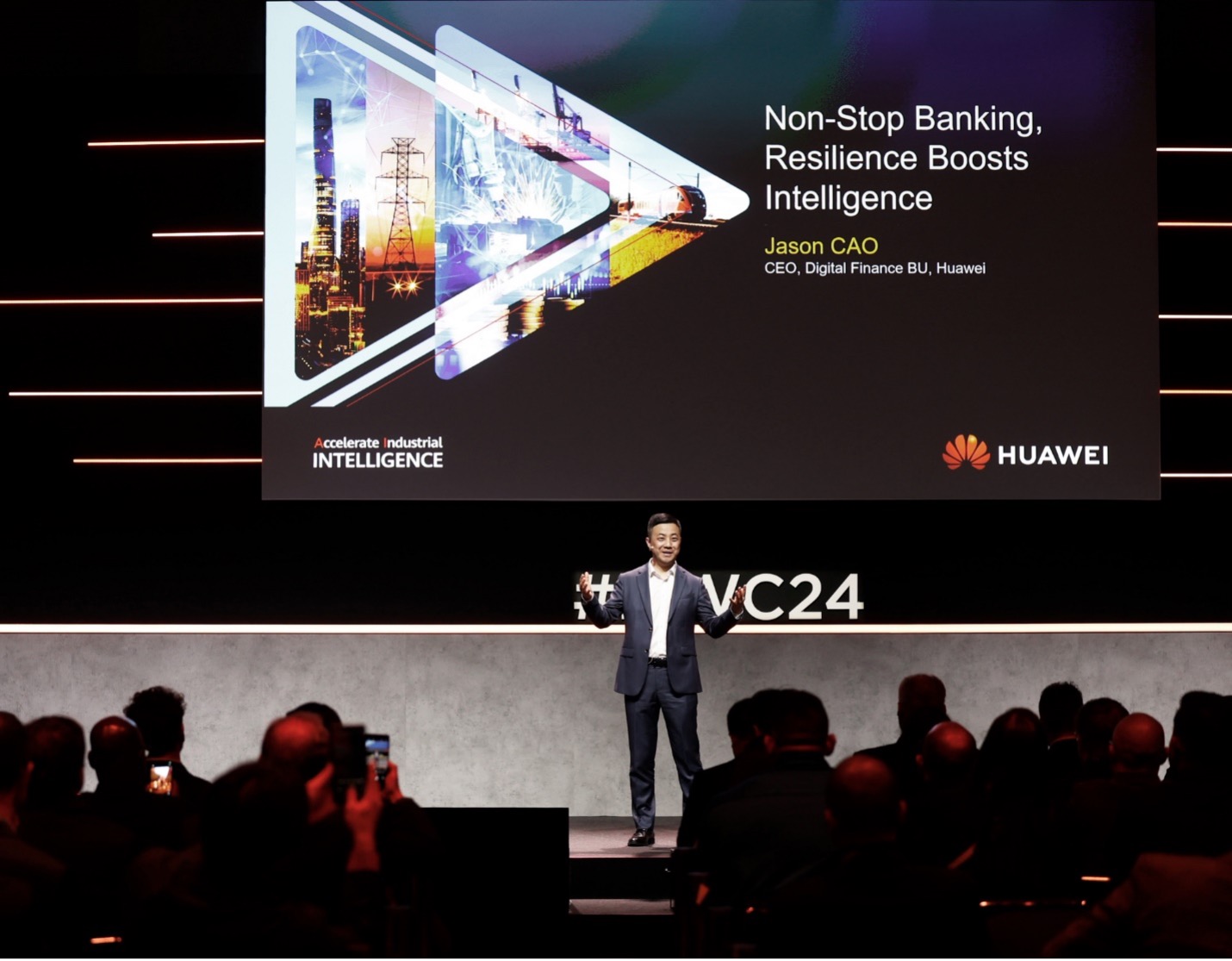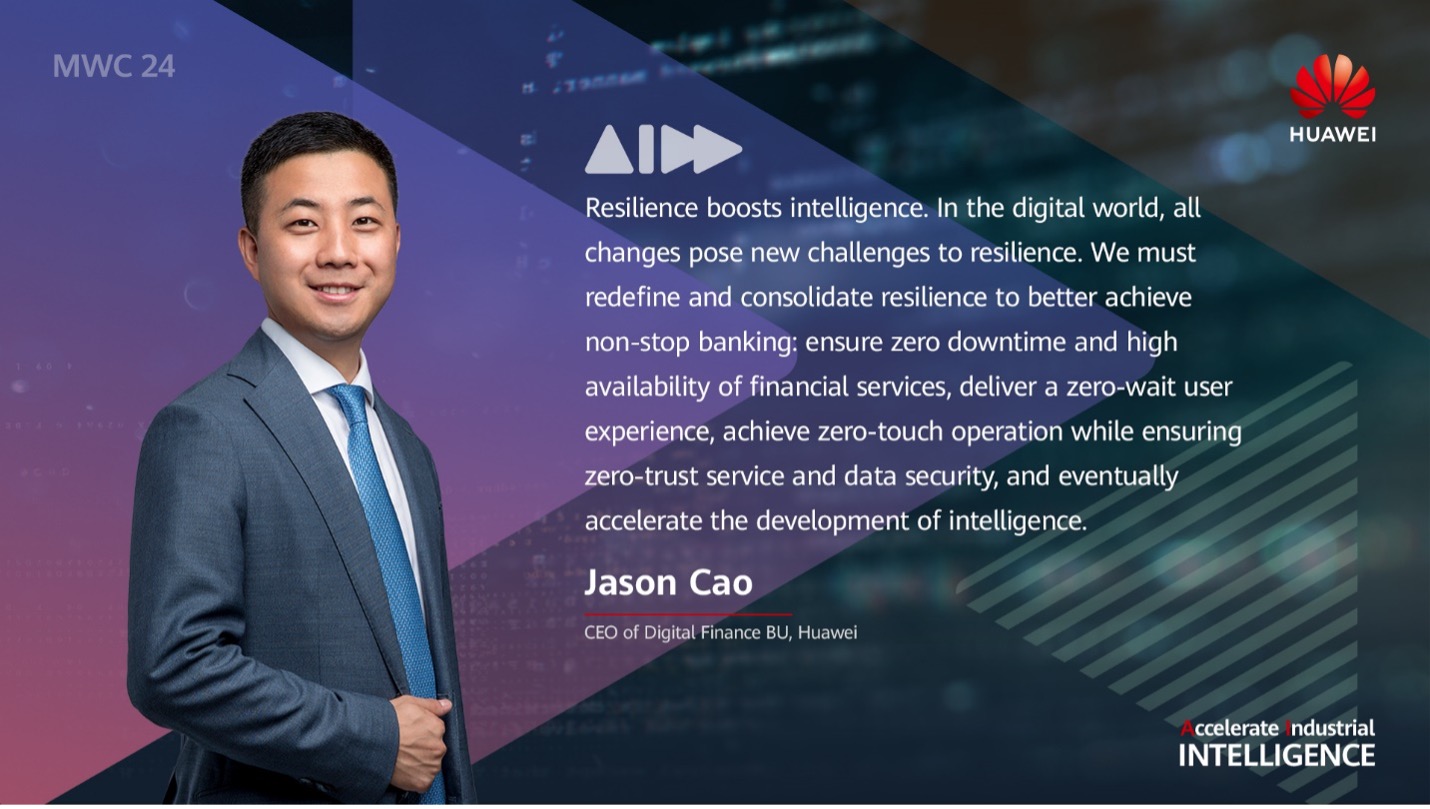
The path to always-on banking lies in reimagining resilience. At Mobile World Congress 2024, Huawei provided a blueprint for intelligent finance with its "4 Zeros" framework. FStech explores this new approach to infrastructure and looks at how financial institutions can deliver the non-stop digital services that customers demand in the 21st century.
In the modern era, digital financial services represented by real-time payments, Open Banking and more are booming, but the technical requirements to meet consumer demand in a cost efficient, compliant and secure manner can pose challenges for financial institutions.
At Mobile World Congress 2024 (MWC2024), Jason Cao, Huawei's CEO of Digital Finance BU, called on the industry to redefine and consolidate resilience to better accelerate the development of intelligence and deliver non-stop banking services.
In the session, entitled "Non-Stop Banking, Resilience Boosts Intelligence" Cao delivered Huawei’s “4 Zeros" as a means of redefining infrastructure resilience in the intelligent era. Those “4 Zeros” promise to ensure zero downtime and high availability of financial services, deliver a zero-wait user experience, and achieve zero-touch operation while ensuring zero-trust service and data security.
Explaining that the company has worked with 3,300 financial customers in more than 60 countries and regions, including 53 of the world's top 100 banks, Cao said that Huawei is committed to accelerating the digitalisation and intelligence of finance and laid out the importance of infrastructure resilience “because resilience is the foundation for everything”.

Building toward zero downtime
With the rise of real-time payments and open banking, financial transactions have skyrocketed while user expectations for always-on services have increased. However, traditional IT infrastructure struggles to match these demands.
Cao said that Huawei is tackling zero downtime through solutions for high availability across databases, storage, and systems.
A key enabler is the multi-active system (MAS) architecture that eliminates single points of failure. For example, MAS helped a top bank in China reduce recovery time objective (RTO) to 120 seconds for core credit services as stated by Cao.
Similarly, databases play a pivotal role in achieving service level agreements (SLAs) of 99.999 per cent of uptime. Cao explained that Huawei's new distributed database announced at MWC 2024, GaussDB, overcomes the limits of traditional databases through an innovative architecture optimised for high availability, with key capabilities including simplified disaster recovery, parallel computing, and non-disruptive scaling.
Cao gave the example of a top Chinese bank which utilises GaussDB to support over 2 billion daily transactions for core systems with zero downtime. Its automated migration tools reduced workloads by 90 per cent during database replacement, he added.
Along with databases, storage is critical for high availability. Cao gave another example of Saudi Arabia's Riyad Bank, which utilises Huawei's OceanStor all-flash storage to achieve three years of zero-downtime for core banking applications. The company’s all-flash storage now safeguards over 1000 petabytes for financial organisations worldwide, including leading banks in Singapore, Brazil, and Turkey.
Ultimately, intelligent integration of the right technologies can help banks deliver excellent mobile and online banking services while achieving zero downtime and reduce workloads.
Smarter operations via zero touch networks
Large-scale digitalisation has allowed financial institutions to deliver banking services which would have been unimaginable at the turn of the century, but it has made financial networks massively complex. As such, it is becoming increasingly clear that autonomous driving networks are critical for stable operations.
Emerging autonomous driving network solutions powered by AI and digital twins, such as Huawei's Autonomous Driving Network solution, enable zero-touch operations. Within the Autonomous Driving Network lies Digital Map, which Cao described as the solution’s “most important capability”.
By creating a virtual replica of the physical infrastructure, the solution provides operators with end-to-end visibility and control, allowing for near real-time fault detection, root cause analysis, and automated recovery.
The executive gave an example of a top Chinese bank which has utilised Huawei's Autonomous Driving Network solution to shorten fault detection to seconds while boosting network change success to 100 per cent. It also slashed the time needed for risk assessment and troubleshooting by 50 per cent and 88 per cent respectively, and overall reduced network touch points by 90 per cent.
With innovations like digital twins, autonomous networks are cutting troubleshooting and maintenance needs for financial institutions, highlighting that the future of smooth operations is zero touch.
Adopting a zero trust approach to security
Financial institutions face an onslaught of sophisticated cyber threats with attacks on banks surging 520 per cent in 2023 alone. Attackers are evolving while vulnerabilities are expanding across digital ecosystems and ever-increasing digitalisation is painting an even bigger target on the backs of banks and other organisations in the sector.
As arguably the most important part of the ‘4 Zeros’, a zero trust model for security is essential. By assuming breach and compartmentalising risk, financial institutions can minimise disruption from ransomware and data breaches.
Financial institutions must look to sophisticated data security solutions such as Huawei’s OceanProtect solution which delivers the industry’s first multi-layer ransomware protection, combining network-level detection with storage-level isolation. The technology’s parallel algorithms deliver over 170 TB/hour restore speeds, five times faster than competitors, Cao said.
“Attack and defence are in a race against time, so the speed is critical,” Cao explained during his MWC presentation. “Huawei keeps improving for fast attack detection, virus isolation, and data recovery.”
He added that Huawei built data security solutions for more than 40 top banks in 2023, protecting more than 100 petabytes of core production data.
Delivering zero wait digital experiences
While it is imperative to ensure services are available 24/7/365, the speed of access is also a difference maker for leading financial institutions.
Traditional data architectures with fragmented data have made it hard to fuel real-time analytics and personalised services, leaving some traditional financial institutions behind. Next-generation data warehousing brings together elastic cloud infrastructure, real-time streams, and AI algorithms to power instant queries and actionable insights from massive datasets.
Cao pointed to the success story of Thailand's largest credit card issuer, which utilised Huawei's next-gen data warehouse service to transition from batch processing to real-time engagement across customer touchpoints.
Leading banks in China, Thailand, and elsewhere are also leveraging Huawei's data intelligence to make every financial interaction timely.
With real-time data access, financial organisations can build dynamic customer profiles and deliver hyper-personalised interactions. By converging data and AI in the cloud, zero wait engagements will become the norm, not the exception.
Four Zeros for success
Future First, Resilience Must. Regardless of size, it is important for banks to reconsider and reshape their approaches to resilience in this digital world.
The path forward is clear – resilient systems, autonomous operations, proactive security, and instant experiences are key pillars of the intelligent finance era. With commitment and collaboration, the financial industry can make the “4 Zeros” framework a reality. Non-stop digital banking is closer than ever.
Latest News
-
Mizuho to replace 5,000 administrative roles with AI
-
Allica achieves unicorn status through latest funding round
-
AI disruption risk varies between platform and service-based firms, says new report
-
ClearBank moves into the heart of London’s financial centre
-
Citi forms AI infrastructure banking team and invests in Sakana AI
-
HSBC chief Elhedery says overhaul nearly complete despite profit fall
Creating value together: Strategic partnerships in the age of GCCs
As Global Capability Centres reshape the financial services landscape, one question stands out: how do leading banks balance in-house innovation with strategic partnerships to drive real transformation?
Data trust in the AI era: Building customer confidence through responsible banking
In the second episode of FStech’s three-part video podcast series sponsored by HCLTech, Sudip Lahiri, Executive Vice President & Head of Financial Services for Europe & UKI at HCLTech examines the critical relationship between data trust, transparency, and responsible AI implementation in financial services.
Banking's GenAI evolution: Beyond the hype, building the future
In the first episode of a three-part video podcast series sponsored by HCLTech, Sudip Lahiri, Executive Vice President & Head of Financial Services for Europe & UKI at HCLTech explores how financial institutions can navigate the transformative potential of Generative AI while building lasting foundations for innovation.
Beyond compliance: Building unshakeable operational resilience in financial services
In today's rapidly evolving financial landscape, operational resilience has become a critical focus for institutions worldwide. As regulatory requirements grow more complex and cyber threats, particularly ransomware, become increasingly sophisticated, financial services providers must adapt and strengthen their defences. The intersection of compliance, technology, and security presents both challenges and opportunities.
© 2019 Perspective Publishing Privacy & Cookies



.jpg)
.jpg)











Recent Stories